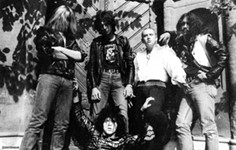In Person
Fri., April 17, 1998
"This is a lesson in oral history. When you find this person, it is your job to chronicle their life," remarked Richard Linklater, discussing how Claude Stanush had preserved history by discovering Willis and Joe Newton and recording their conversations before they died. In 1973, Stanush and David Middleton interviewed the brothers for a documentary and a book, upon which the film The Newton Boys, directed by Linklater, was based. Fitting for a panel discussion about an oral history, Stanush, Middleton, Linklater, and Clark Lee Walker (the film's co-screenwriter) didn't really discuss so much as they told stories to a standing-room-only crowd at Barnes & Noble Arboretum on March 30.
Stanush described one of their first meetings with the Newton boys, which was to last a day but stretched into a week. Willis showed up driving a big, shiny Buick, and Joe brought his horse, Old Paint. The brothers had different styles but as one family friend described Joe's feelings, "I don't think he really liked Willis, but he loved him."
The book, The Newton Boys: Portrait of an Outlaw Gang by Claude Stanush (State House Press, $24.95 hard), explores life in early 20th-century West Texas with the Newton family. Willis gets the most ink, but when Joe speaks he reveals much about himself - his regret about having gotten caught up in criminal life and a longing for the days he broke horses. Willis is honest about himself and the role he played as gang leader: "My mother, she said, `Willis, I guess if I had been a man, I'd a-been a bank robber or outlaw, too.' I'm the only one that took after my mother completely."
What seems remarkable about the Newton boys is not their status as history's greatest train and bank robbers, but that they survived a hard life without much bitterness. Picking cotton as young kids, hounded by the law even when they hadn't committed a crime, is it any wonder they did whatever they could to pursue a better life? Somewhere between their mother telling stories about outlaws and explaining the meaning of the Bible, the brothers developed a code of ethics that they later used while breaking the law. Willis described it as a successful business, which in this case means that they obtained their money without hurting anyone. All this makes for a complicated set of characters, but then no Texan ever thought of their people as being "simple." -Anne Wick






